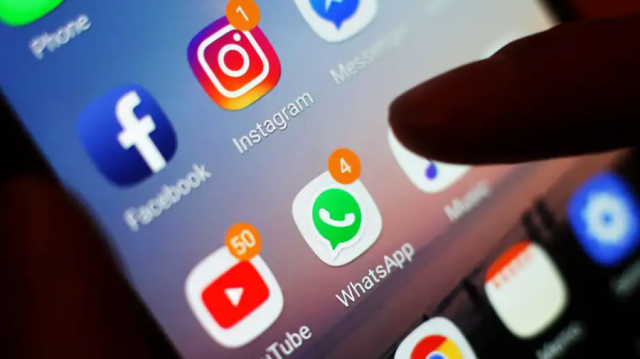
 Flash News
Flash News
Gunfire in Durres, a 30-year-old man is injured
Accident on Arbri Street, car goes off the road, two injured
Arrests of "Bankers Petrolium", Prosecution provides details: Exported and sold 532 billion lek of oil, caused millions of euros in damage to the state
Ndahet nga jeta tragjikisht në moshën 28-vjeçare ylli i Liverpool, Diogo Jota
Posta e mëngjesit/ Me 2 rreshta: Çfarë pati rëndësi dje në Shqipëri

People interact on social media, online platforms, and chatbots. These digital relationships are increasingly influencing how we conduct our relationships in real life.
When we use social media, social needs play an important role. In addition to practical reasons such as seeking information or entertainment, what motivates us most is the desire to create relationships.
Research is currently underway into the impact these relationships and the way we build relationships online have on our real lives. Social psychologist Johanna Lisa Degen from the University of Flensburg is one of the scientists who is studying in depth the creation of digital relationships on social media, their platforms and chatbots.
In recent psychological research, the term "parasociality" has been used to describe this phenomenon. This refers to the one-sided relationships between fans and their favorite stars. Today, there is a broader spectrum of parasociality online.
Wide spectrum of online relationship building
Johanna Lisa Degen includes in the term parasociality, for example, relationships formed through messaging services or dating apps. This represents at least "almost half of all relationships formed in the last five years."
The topic of online jealousy also falls into the spectrum of parasociality. This has to do with, for example, how much access someone has to their partner's data. And the discussion of where emotional infidelity really begins. Is it simply liking other people's photos online or following them on social media?
The way we present ourselves online—making everything incredibly beautiful, attractive, and interesting—means that even in real-life dating culture, a lot of things are performance-oriented.
Social psychologist Lisa Degen explains that this goes so far as to say that some people try not to experience orgasm in real life during sex so as not to get their faces scratched.
Conflicts are better resolved online
Nowadays, not only meetings, but also family and friendship relationships are organized via messaging services such as WhatsApp or other social media platforms. In this way, important parts of relationships are transferred to the digital sphere. One consequence of this is that conflicts are increasingly resolved less face-to-face and more via WhatsApp.
This gives us a little more time and allows us to reason without immediately responding to the other person. Many people are already accustomed to this type of relational communication and find it more enjoyable than resolving a conflict in real life.
Seeking relaxation on social media
Another parasocial phenomenon is that more and more people are seeking and finding relaxation on social media. For them, these networks are a safe, always-available place where they find predictable content that allows them to calm down and immerse themselves in an atmosphere of well-being.
This has an impact on our behavior and our ability to self-regulate, explains social psychologist Degen at a press conference of the German Society for Psychosomatic Medicine and Medical Psychotherapy (DGPM).
Making money in digital relationships is accepted
Digital relationships can also be one-sided, for example, when you follow influential people, influencers, and thus participate in their lives. That there is an economic interest behind these relationships is also increasingly considered normal.
Many demonstrate their loyalty by saying: "Of course I'll buy the products too, because I want to support this person." This is what social psychologist Degen has discovered in her research. She warns that we are becoming accustomed to the fact that economic interests can also play a role in social relationships.
Competition between digital and real relationships
As enjoyable as digital relationships are, they compete for our time and emotions with real-life relationships. Psychologists warn that we increasingly have the same expectations in real-life relationships as in digital ones.
This means that we expect real relationships to be constantly available, absolutely presentable, unchanging, and not to challenge us or confront us with opposing opinions.
Latest news










Greece imposes fee to visit Santorini, how many euros tourists must pay
2025-07-03 20:50:37
Don't make fun of the highlanders, Elisa!
2025-07-03 20:43:43
Gunfire in Durres, a 30-year-old man is injured
2025-07-03 20:30:52

The recount in Fier cast doubt on the integrity of the vote
2025-07-03 20:09:03




Heatwave has left at least 9 dead this week in Europe
2025-07-03 19:00:01

Oil exploitation, Bankers accused of 20-year fraud scheme
2025-07-03 18:33:52
Three drinks that make you sweat less in the summer
2025-07-03 18:19:35
What we know so far about the deaths of Diogo Jota and his brother André Silva
2025-07-03 18:01:56



Another heat wave is expected to grip Europe
2025-07-03 17:10:58

Accident on Arbri Street, car goes off the road, two injured
2025-07-03 16:45:27

Accused of two murders, England says "NO" to Ilirjan Zeqaj's extradition
2025-07-03 16:25:05





Gaza rescue teams: Israeli forces killed 25 people, 12 in shelters
2025-07-03 15:08:43
Diddy's trial ends, producer denied bail
2025-07-03 15:02:41

Agricultural production costs are rising rapidly, 4.8% in 2024
2025-07-03 14:55:13
Warning signs of poor blood circulation
2025-07-03 14:49:47
Croatia recommends its citizens not to travel to Serbia
2025-07-03 14:31:19
Berisha: Albania is the blackest stain in Europe for the export of emigrants
2025-07-03 14:20:19


'Ministry of Smoke': Activists Blame Government for Wasteland Fires
2025-07-03 13:59:09

AFF message of condolences for the tragic loss of Diogo Jota and his brother
2025-07-03 13:41:36
Five healthy foods you should add to your diet
2025-07-03 13:30:19






A unique summer season, full of rhythm and rewards for Credins bank customers!
2025-07-03 12:12:20

Fire situation in the country, 29 fires reported in 24 hours
2025-07-03 12:00:04
The constitution of the Kosovo Assembly fails for the 41st time
2025-07-03 11:59:57
The gendering of politics
2025-07-03 11:48:36

The price we pay after the "elections"
2025-07-03 11:25:39

Xhafa: The fire at the Elbasan landfill was deliberately lit to destroy evidence
2025-07-03 11:08:43

The 3 zodiac signs that will have financial growth during July
2025-07-03 10:48:01
Democratic MP talks about the incinerator, Spiropali turns off her microphone
2025-07-03 10:39:24

Ndahet nga jeta tragjikisht në moshën 28-vjeçare ylli i Liverpool, Diogo Jota
2025-07-03 10:21:03
Cocaine trafficking network in Greece, including Albanians, uncovered
2025-07-03 10:10:12



Korreshi: Election manipulation began long before the voting date
2025-07-03 09:39:13
Arrest of Greek customs officer 'paralyzes' vehicle traffic at Qafë Botë
2025-07-03 09:28:41
After Tirana and Fier, the boxes are opened in Durrës today
2025-07-03 09:21:10
Enea Mihaj transfers to the USA, will play as an opponent of Messi and Uzun
2025-07-03 09:10:04

Foreign exchange, the rate at which foreign currencies are sold and bought
2025-07-03 08:53:50
Index, Albania has the worst quality of life in Europe
2025-07-03 08:48:10


Horoscope, what do the stars have in store for you today?
2025-07-03 08:17:05
Clear weather and high temperatures, here's the forecast for this Thursday
2025-07-03 08:00:37
Posta e mëngjesit/ Me 2 rreshta: Çfarë pati rëndësi dje në Shqipëri
2025-07-03 07:46:48



Lufta në Gaza/ Pse Netanyahu do vetëm një armëpushim 60-ditor, jo të përhershëm?
2025-07-02 21:56:08
US suspends some military aid to Ukraine
2025-07-02 21:40:55



Methadone shortage, users return to heroin: We steal to buy it
2025-07-02 20:57:35
Government enters oil market, Rama: New price for consumers
2025-07-02 20:43:30
WHO calls for 50% price hike for tobacco, alcohol and sugary drinks
2025-07-02 20:41:53



